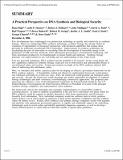| dc.description.abstract | Few developments have leapfrogged over predecessor technology as quickly and extensively as synthetic
biology. Based on cutting-edge DNA synthesis technology, synthetic biology has already fueled an
expansion of opportunities in biological engineering, with advanced capabilities that surpass those
provided by traditional recombinant DNA technology. Improvements in synthesis technology are
accelerating the pace of innovation in everything from the development of renewable energy to the
production of bulk and fine chemicals, from information processing to environmental monitoring, and
from agricultural productivity to breakthroughs in human health and medicine. Synthetic biology
promises vast improvements to our well-being and our understanding of the living world.
Like any powerful technology, DNA synthesis has the potential to be misused. In the wrong hands, the
new capabilities enabled by synthetic biology could give rise to both known and unforeseeable threats to
our biological safety and security. Current government oversight of the DNA synthesis industry falls
short of addressing this unfortunate reality.
Here, we introduce and outline a practical plan for developing an effective governance framework for the
DNA synthesis industry. A thoughtfully crafted and effectively implemented framework would protect
our continued well-being in at least two ways. First, the framework would promote our biological safety
and security. Second, the framework would encourage the further responsible development of synthetic
biology technologies and their continued, overwhelmingly constructive application. The proposed plan
represents the collective views of the International Consortium for Polynucleotide Synthesis, the U.S.
Federal Bureau of Investigation, the Chief Executive Officers or Presidents of several of the principal
synthetic biology companies, and representatives from academia.
Our framework calls for the immediate and systematic implementation of a tiered DNA synthesis
screening process. In order to establish accountability at the user level, individuals who place orders for
DNA synthesis would be required to identify themselves, their home organization, and all relevant
biosafety level information. Next, individual companies would use software tools to check synthesis
orders against a set of select agents or sequences to help ensure regulatory compliance and flag synthesis
orders for further review. Finally, DNA synthesis and synthetic biology companies would work together,
and interface with appropriate government agencies, to rapidly and continually improve the underlying
technologies used to screen orders and identify potentially dangerous sequences, as well as develop a
clearly defined process to report behavior that falls outside of agreed-upon guidelines. | en |
